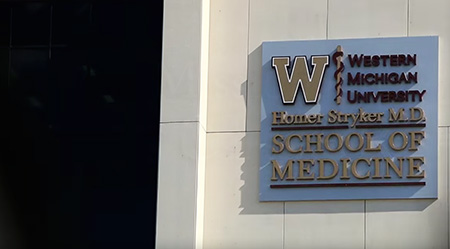
A one-stop shop for research assistance at Western Michigan University Homer Stryker M.D. School of Medicine (WMed) is providing ample benefits to faculty, staff, residents, and students embarking on research at the medical school.
The Data Analytics Services Unit (DASU), housed within the Department of Biomedical Informatics, provides an array of services for data collection and management as well as biostatistical support. The unit is available to consult and collaborate on research projects, quality improvement projects, grants, and presentations or manuscripts.
“Our mantra is to be helpful and to focus on solutions,” said Philip Kroth, MD, MSc, associate dean for Health Services Research and chair of the Department of Biomedical Informatics. “We've created a streamlined process optimized for junior investigators, helping those that are new to research to benefit from our experience with various databases.”
The DASU is available to assist at varying stages of the research process, from project initiation to manuscript publication, and is happy to provide data management services, REDCap development services, and biostatistical consulting services for any project that involves WMed faculty and staff, residents, or students.
“We offer biostatistical consultation free to our investigators in unlimited supply, which is an extremely valuable and rare thing for a medical school to do,” Dr. Kroth said. “Most medical schools charge, which makes it very difficult to start out if you don't have any funding.”
These days, the DASU is involved in about 30 to 50 projects at any given time, helping investigators determine the feasibility of their projects, refine their scientific questions and acquire the data necessary to help answer them.
“We want it to be equitable for everybody,” DASU Director Theresa McGoff said. “We have a process so that we're catering to everyone in a timely manner and we want to give everybody enough support and make sure we're putting the time into everyone's project. Their success is our success.”
Investigators interested in working with the DASU are directed to fill out a webform outlining the parameters of their project. From there, members of the DASU – including a biostatistician, data manager and research navigator – schedule a “triage” meeting with the research team, which effectively serves as a brainstorming session where they collectively determine whether the research project is feasible and, if so, what the best strategies might be to gather the requested data.
At the same time, the research navigator actively works to match medical students and residents with research opportunities. During the triage process, the research navigator asks investigators if they would like to have learners help with their project, and those research opportunities are then posted to an online ‘Opportunities Portal’ that can be accessed by interested students and residents.
As projects progress, the DASU remains available to analyze data as outlined in the project protocol or proposal. The biostatisticians provide the investigation team results and are available to help with any interpretation or clarification and can also assist in writing up the biostatistical results for manuscripts and presentations.
“Investigators register in a centralized place, it's tracked, and then we track that project throughout its life and the data that gets associated with that,” Dr. Kroth said. “Our process may appear to be a little stilted at times, but there's a reason behind our process, and it's to do many things: It's to help protect the investigator from failure; it’s to help us keep everyone between the guardrails regulation-wise; and it's to help us to get maximum value from our resources.”
When it was formed in 2021, the DASU initially focused primarily on clinical data, but has since expanded its reach to also oversee and manage educational data, with a constant eye on finding and acquiring new data sources when possible, thus expanding the number of research opportunities.
In addition to helping those within the medical school, the DASU also provides biostatistical services to a variety of external partners including Bronson Healthcare and West Michigan Cancer Center, among others.
Overall, the DASU is and remains committed to supporting the medical school grow in its research capability.
“There are many times we'll get done with a triage meeting with investigators and they'll say, ‘This was so helpful to sit and talk to all of you about our project,’” McGoff said. “Those moments are why I love my job, and it's great that we have a smooth process so we can get to that end result pretty quickly.”
For more information about the DASU and its services, visit wmed.edu/dataanalytics.
